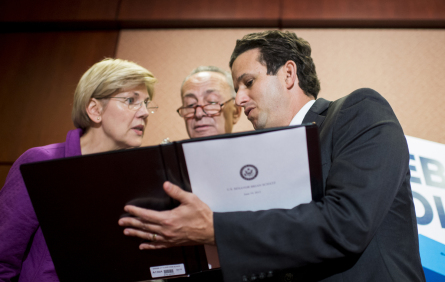
Sen. Elizabeth Warren might have the biggest grass-roots megaphone in the Democratic caucus, and Charles E. Schumer is in line to be the next Democratic leader.
On Wednesday, the Democrats from Massachusetts and New York appeared with a relatively new colleague with lower name ID, but with a rising profile on the left. Sen. Brian Schatz took center stage to highlight a campaign with the Progressive Change Campaign Committee and a coalition for “debt-free college.”
It was one of a trio of policy rollouts for the Hawaii Democrat this week, with Schatz taking disparate approaches to reducing the cost of higher education, combating climate change and advancing a progressive foreign-policy vision.
“There’s more than one thing to do and there is more than one way to do it,” Schatz told CQ Roll Call. “My approach has been to evaluate the political context in which an issue ought to be addressed and to determine whether it’s appropriate to work from the inside of the legislative body — in committee and on the floor — or whether this is going to require additional citizen engagement or engaging with opinion-makers.”
At the education event, Schatz and Schumer made clear they were seeking to promote outside engagement.
“These costs discourage people from going to college at all, and if we’re serious about wanting people to pursue higher education, we can’t put them on the brink of bankruptcy every time they graduate,” Schatz said. “This ought to be an issue for this Congress, for next Congress and this coming election.”
Later Wednesday, Schatz explained his strategy in an interview.
“There are issues that are not yet ripe in the Congress but absolutely are full of momentum with the public, and I think the debt-free college issue is one of those,” Schatz said. “Where we are moving on gay rights is another one of those.”
In March, Schatz offered a nonbinding budget amendment in support of Social Security and veterans benefits for married gay couples that appeared to vex some Republican senators.
“You ought to be tough on the issues and easy on each other, and so it’s fair to say I’m a strong progressive,” Schatz said. “I really think it’s important to maintain good personal, collegial relationships across the ideological spectrum because that’s the only way, in the end, that we’re going to get anything done.”
Schatz spoke to CQ Roll Call by phone while returning from much less traditionally friendly turf at the American Enterprise Institute with Sen. Sheldon Whitehouse, D-R.I., joining one of the caucus’ loudest voices on climate issues to tout a carbon tax.
“Senator Schatz has emerged as a passionate ally on climate change. Beyond that, he brings a combination of kindness and gravitas that makes him a valued asset to our caucus on a great many issues,” Whitehouse, the lead sponsor of the climate bill, said in a statement.
“Sheldon and I have no desire for this to be a Democrats-only issue,” Schatz told the AEI crowd. “We have a strong desire to build partnerships, to argue in public or in private about whether or not our bill makes sense as a matter of public policy, but let’s begin this discussion as Americans, in earnest.”
“We’ve been asked over the last couple of days how we’re doing getting Republican support for the bill and why [we’re announcing] this legislation at the American Enterprise Institute,” Schatz said. “It’s because this is an area that does demand conservative leadership. We have constructed a market-based solution to one of the great challenges of our time, and in the tradition of Margaret Thatcher and Barry Goldwater and many other conservative environmentalists, we need conservatives to embrace their own market-based solutions to our collective climate challenge.”
While Schatz is getting the most attention for his domestic agenda, he’s also demonstrating himself to be a progressive on foreign policy views, having just signed onto an opinion piece in Foreign Affairs with Christopher S. Murphy of Connecticut and Martin Heinrich of New Mexico.
“The new world order demands that the United States think anew about the tools that it will use to lead the world, including reaching beyond the military budget to rediscover the power of non-kinetic statecraft,” the senators wrote. Among the approaches the trio are touting is a new “Marshall Plan” of foreign aid to countries under threat of terrorism or pressure from Russia and China, constraints on surveillance, and a skepticism about unilateral military action.
Schatz, a 42-year-old who replaced the legendary Daniel K. Inouye in the Senate, is at the start of what could easily be a decades-long career.
“My plan is to be representing Hawaii for as long as the people want me to do so,” Schatz said. “The Senate has changed, the Congress has changed, but the rules of seniority have not, and so representing Hawaii, I’m mindful to climb the seniority ladder by working hard and doing right by my constituents.
- Publish my comments...
- 0 Comments
